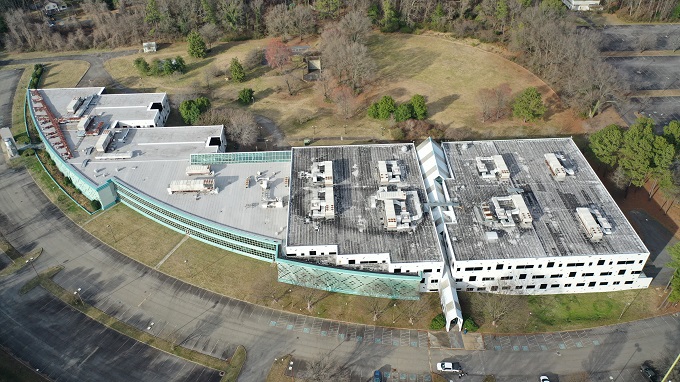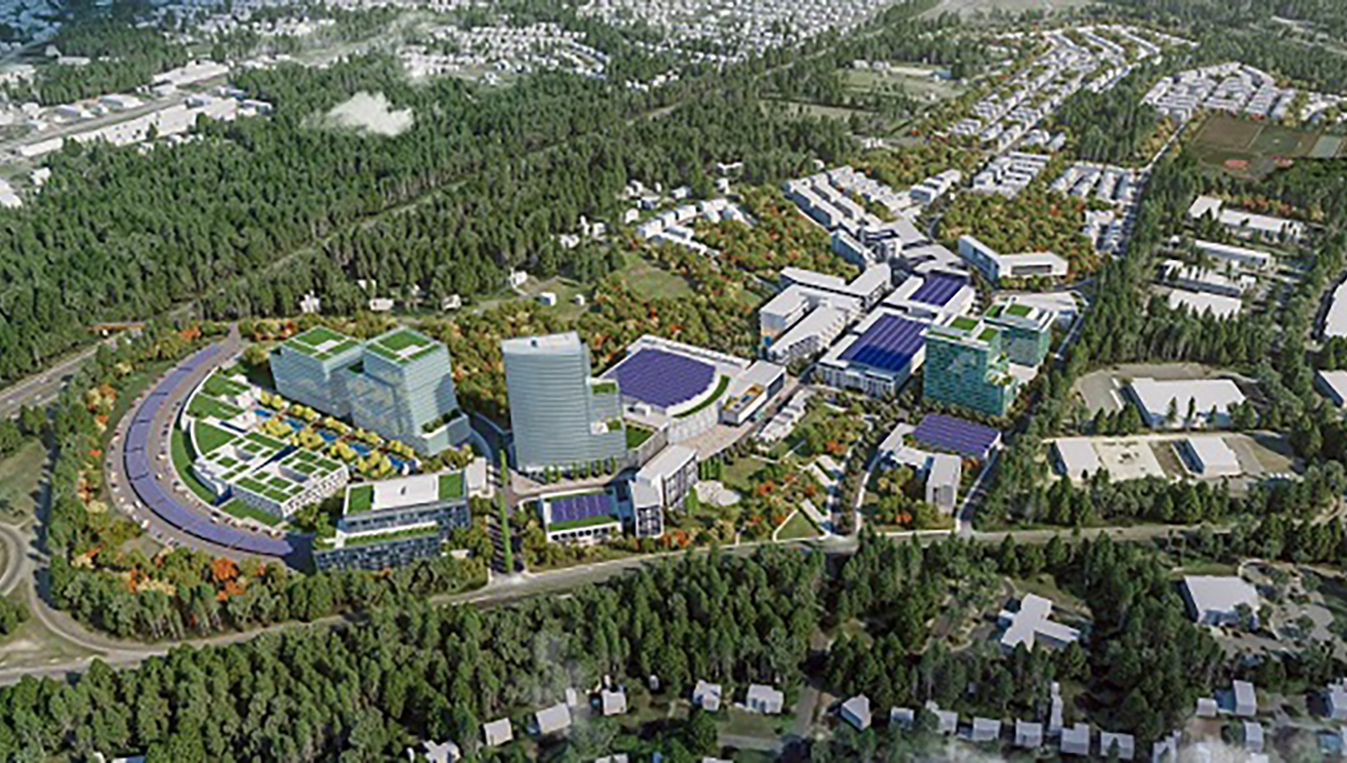Henrico EDA sues GreenCity developers amid ASM Global’s debt dispute

A conceptual rendering shows the arena in relation to other buildings in the proposed GreenCity mixed-use development. (BizSense file)
Recent legal filings from the would-be arena operator for the stalled GreenCity development in Henrico have thrown a wrench into the agreed-to transfer of the project site, prompting a lawsuit from the county’s Economic Development Authority against the project’s former developers.
The EDA on Tuesday filed a lawsuit asking a Henrico Circuit judge to force the developers, Green City Partners, to convey back to the authority the former Best Products property at Interstate 95 and Parham Road, as the parties had reportedly agreed to do through a repurchase option in their development agreement.
The authority alleges that Green City Partners and its land ownership entity, Green City Development Corp., have refused to transfer the 93-acre property in light of the filings this month from ASM Global, which is seeking $1.5 million it says it is owed from the developers. The amount stems from a loan ASM provided to the developers when it signed on to develop and manage the project’s anchor arena.
ASM on April 11 filed a confessed judgment against the developers for the debt and served the EDA with a suggested garnishment summons to collect what the developers had paid for the property so far. That amount, $1 million, is what the EDA planned to pay back to the developers through the repurchase option that would return the property’s ownership to the EDA.
The developers filed responses to ASM last week seeking to have the confessed judgment vacated and the garnishment summons quashed. The developers argue that the attorney who filed the confessed judgment was not designated to do so because he is not named on the promissory note for the loan, and that the garnishment summons was prematurely filed in violation of state law.
In its lawsuit, the EDA says it told the developers that it was prepared to close on the $1 million repurchase for the property April 15, but that since ASM’s garnishment summons was issued, the developers have “refused to convey” the property unless ASM agrees that the EDA may pay “some or all” of the $1 million to the developers rather than to ASM via the summons.
The EDA is asking the court to compel the developers to convey the property through the repurchase process or to award damages to the EDA to be paid by the developers. The damages amount is not specified in the suit, which includes a count each of specific performance and breach of contract.
The EDA is represented in the suit by Tyler Brown of Hunton Andrews Kurth. Calls to Brown were not returned Wednesday.
A response to ASM’s garnishment summons was filed Monday but wasn’t reflected in court records until Wednesday afternoon. Abbreviated case information available online indicates a “no funds” response to the summons, which was entered into the court and listed this Friday as a hearing date.
The garnishment summons was filed for ASM by Richard Brand of ArentFox Schiff in San Francisco. The $1.5 million sought by ASM consists of the 2023 loan’s principal amount, $995,000, plus interest and attorneys’ fees. The loan note’s terms required full payment by the end of that year.
The confessed judgment was filed by another attorney, Bruce Hanson, who was general counsel at ASM until last September and is now with another company.
In its responses to those filings, the developers argue that the confessed judgment is invalid – and thus so is the garnishment summons – because Hanson is not named as the attorney-in-fact on the 2023 promissory note between the developers and ASM, through which ASM lent them $995,000. The developers’ filings state that a space on the note where the designee’s name would have been inserted was left blank.
The developers argue that a confessed judgment cannot be made if the power of attorney is not clear. The lawsuit cites a section of Virginia code that states that “any power of attorney incorporated in, and made part of, any note or bond authorizing” a confessed judgment in the event of a payment default “shall specifically name therein the attorney or attorneys or other person or persons authorized to confess such judgment.”
O’Hagan Meyer attorneys Thomas Wolf and Joseph Rainsbury are representing the developers in the case.
Green City Partners and Green City Development Corp. are both led by Susan Eastridge, CEO of Falls Church-based Concord Eastridge, and Michael Hallmark, a principal with Richmond-based Future Cities.
Eastridge and Hallmark were also the development team behind the unsuccessful Navy Hill plan to replace the Richmond Coliseum with a new arena, as well as the ill-fated redevelopment of Richmond’s Public Safety Building to include a high-rise office tower for VCU Health.
Neither Eastridge nor Hallmark has responded to requests from BizSense for comment about GreenCity since Henrico deemed them in default on the public-private project.
The default findings cited lack of progress on the project and nonpayment of $5.2 million due in February to complete the land purchase. The $1 million that the developers did pay makes up the first two installments of a three-year payment plan that the parties agreed to in 2022, two years after the $2.3 billion project was announced.
The county is planning a request-for-interest solicitation to find a new developer to continue the commercial portion of GreenCity. Local firm Markel | Eagle is developing the other, residential half of the 200-acre project.
The post Henrico EDA sues GreenCity developers amid ASM Global’s debt dispute appeared first on Richmond BizSense.
Recent Posts










GET MORE INFORMATION
Agent | License ID: 0225209440


